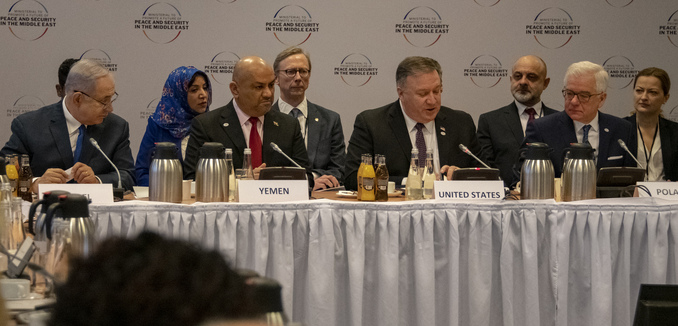The Arab world vowed to intensify its confrontation with Iran at a Middle East summit in Poland, The Times of Israel reported Monday. Senior Arab officials from Saudi Arabia, the United Arab Emirates, and Bahrain said that the 2015 nuclear accord with Iran was a mistake and that the Islamic Republic’s aggression is the most urgent issue facing the region.
Adel al-Jubeir, Saudi minister of state for foreign affairs, said in a tweet over the weekend that “everyone” at the conference in Warsaw agreed that the leading challenge confronting the Middle East was “the Iranian role in destabilizing security and stability in the region.”
“Look at the Palestinians: Who is supporting Hamas and Islamic Jihad, and undercutting the Palestinian Authority? Iran,” al-Jubeir asked during a panel discussion in the Polish capital. “We cannot stabilize the region without peace between Israelis and Palestinians [but] wherever we go we find Iran’s evil behaviour.”
The Saudi minister also lashed out at the Iranian-backed Lebanese terrorist organization Hezbollah. “One of the biggest jokes is when you say Hezbollah has a political wing and a military wing. There is no such thing,” he remarked.
The comments made by al-Jubeir, who was Saudi Arabia’s foreign minister until late last year, widely confirmed what other Arab leaders, as well as Israeli and American officials, reported during the summit.
“We grew up talking about the Israel-Palestine issue as the most important issue” that has to be “solved, one way or another,” Bahraini Foreign Minister Khalid bin Ahmed Al Khalifa observed. “But then, at a later stage, we saw a bigger challenge, we saw a more toxic one — in fact the more toxic one in our history — that came from the Islamic Republic.”
If it wasn’t for Iran’s regional aggression, “we would have been much closer today in solving this issue with Israel,” Khalifa continued, with Israeli Prime Minister Netanyahu and other delegates from 60 countries looking on.
Meanwhile, UAE Foreign Minister Sheikh Abdullah bin Zayed Al Nahyan defended Israel’s right to defend itself against Iranian aggression in Syria, saying, “Every nation has the right to defend itself when it’s challenged by another nation.”
In May 2018, Bahrain made similar comments following Israel’s military response to attempted Iranian missile strikes on an Israeli army base. “As long as Iran has breached the status quo in the region and invaded countries with its forces and missiles, so any state in the region, including Israel, is entitled to defend itself by destroying sources of danger,” Bahrain’s Foreign Minister said at the time.
The Warsaw summit appeared to be the first time an Israeli leader and senior Arab officials were attending an international conference centered on the Middle East since the 1991 Madrid peace summit, which led to the Oslo Accords.
However, the Palestinian leadership boycotted the summit in Poland, dismissing it as “an American conspiracy intended to get the participants to adopt the US’s views on issues of the region, particularly the Palestine question.” The PA also boycotts efforts by the Trump administration to draft a regional peace plan, set to be released after the Israeli elections in April.
[Photo: U.S. Department of State / Flickr ]




